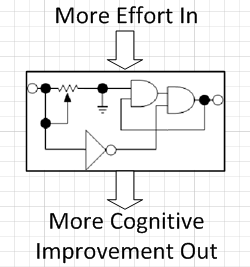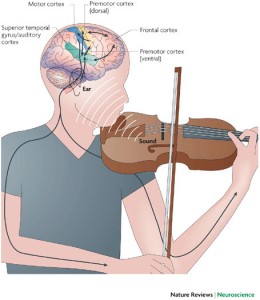Raising Your Kid’s IQ – What Science Tells Us
 If you were to carefully review the scientific studies of the things parents can do to boost their kids’ IQ what would you find? That is exactly what researchers as the NYU Steinhardt School of Culture, Education, and Human Development did and here is what they found:
If you were to carefully review the scientific studies of the things parents can do to boost their kids’ IQ what would you find? That is exactly what researchers as the NYU Steinhardt School of Culture, Education, and Human Development did and here is what they found:
Overall, the results of the meta-analyses indicated that certain dietary and environmental interventions can be effective in raising children’s IQ.
More specifically:
- Pregnant moms or newborn that eat foods rich in Omega-3 can boost IQ by 3.5 points
- Interactive reading or reading with your child boosts IQ by 6 points if they are 4 years old or less
- Going to preschools that includes a language component boosts IQ by 7 points.
Increases in IQ are approximate but these are meaningful improvements.
The researcher expect to uncover additional insights which I will blog about. In the meantime I am interested to hear from readers about specific ways to boost a kid’s IQ.
Categories: Cognitive Development, Diet, Training Tags:
Exercise Boosts Brain In Proportion to Effort Made
 We have reported many times in the Next Brain Blog on scientific studies that suggest exercise improves brain function and cognitive performance. Now a new study led by the director of the Montreal Heart Institute suggests that the more exercise you do the more cognitive improvement you see. The study focused on overweight and inactive adults that were 49 years old on average. A summary of the results:
We have reported many times in the Next Brain Blog on scientific studies that suggest exercise improves brain function and cognitive performance. Now a new study led by the director of the Montreal Heart Institute suggests that the more exercise you do the more cognitive improvement you see. The study focused on overweight and inactive adults that were 49 years old on average. A summary of the results:
“After four months of high-intensity interval training, heart patients in Juneau’s study had markedly improved cognitive functions: the ability to think, recall, and make quick decisions. Even more exciting is that the study demonstrated that the more exercise patients could tolerate, the better their results—their minds became “sharper.”
While there is surely some limit to this effect, it does suggest that increasing the duration/intensity of your workout could lead to an increased brain boost.
Categories: Memory and Learning, Older Adult, Problem Solving, Training Tags:
Good Grades are Mostly Determined by Self-Control
 I am often asked by parents what type of skills are critical for success in school. They hear about special programs or techniques for reading, note taking or math skills and want to know if they work. That is why I am always on the lookout for scientific research that probes how the mind’s of high-performing students work.
I am often asked by parents what type of skills are critical for success in school. They hear about special programs or techniques for reading, note taking or math skills and want to know if they work. That is why I am always on the lookout for scientific research that probes how the mind’s of high-performing students work.
For example, recent research on nearly 700 German eighth graders suggests that a student’s level of self-control is the number one factor that determines success. It is more important than memory, general intelligence, verbal ability, mental speed, numerical ability and even creativity. The researchers claim:
“The data show that the most important factor in getting good school grades was the student’s score on psychological tests of self-control. Cognitive ability was the next best predictor of grades, but in fact, it was not a very strong one.”
While not a surprise to readers of the Next Brain Blog, this is an important finding. Delaying gratification, managing procrastination and the ability to structure and manage time are the capacities that students need for success.
I am interested to hear from readers with insights into how to be an effective student. What learning and testing taking skills are critical and how can we develop them?
Categories: Child, Cognitive Development, College Student, IQ and EQ, Memory and Learning, Training Tags:
Develop Advanced Skills Even Late in Life
 The Kavli Foundation recently released a readable neuroscience research summary titled The Fantastic Plastic Brian. The report highlights the claim that adult brains remain adjustable even in the last years of life. Being adjustable (or plastic) means new neural connections can form and deep learning can take place. One example from the study:
The Kavli Foundation recently released a readable neuroscience research summary titled The Fantastic Plastic Brian. The report highlights the claim that adult brains remain adjustable even in the last years of life. Being adjustable (or plastic) means new neural connections can form and deep learning can take place. One example from the study:
I know a woman who didn’t begin to paint until she was in her 60’s, yet ended her life as a professional painter of high quality. We are capable of remarkable brain changes contributing to the development of remarkable new abilities at any stage of life.
This is an important finding. It means that not only are there natural cognitive advantages to aging (e.g. increased wisdom, emotional intelligence and learning from experience ability) it is possible to develop professional grade skills even in the most challenging domains.
I am interested to hear from readers that have develop new skills after 55 in art, science, engineering, technology, business, writing or another professional area.
Categories: Cognitive Development, Training Tags:
Bilingual Kids Can Have Mental Advantages
 I get emails from parents interested in hearing about evidence-based ways to improve their children’s brain function and cognitive performance. So I am always on the lookout for scientific studies that suggest Next Brain development ideas for kids. That’s why a university study from Scotland caught my eye. Researchers there found that children speaking two languages (bilingual) can have more mental agility than those that don’t. More specifically:
I get emails from parents interested in hearing about evidence-based ways to improve their children’s brain function and cognitive performance. So I am always on the lookout for scientific studies that suggest Next Brain development ideas for kids. That’s why a university study from Scotland caught my eye. Researchers there found that children speaking two languages (bilingual) can have more mental agility than those that don’t. More specifically:
“Our study has found that it can have demonstrable benefits, not only in language but in arithmetic, problem solving and enabling children to think creatively. We also assessed the children’s vocabulary, not so much for their knowledge of words as their understanding of them. Again, there was a marked difference in the level of detail and richness in description from the bilingual pupils.”
The children in the study were around age nine and the bilinguals spoke Italian and English. It is important to note that they do not claim that learning a second language will produce these cognitive improvements. But is is suggestive.
Interested to hear from readers that live in a bilingual household or that have extensive second language experience. How does it enrich your language skills and thinking abilities?
Categories: Child, Cognitive Development, Problem Solving, Training Tags:
10 Years of Music Creates Big Cognitive Reserve
 We have covered the importance of music for improving cognitive performance in several posts on the Next Brain Blog. Some researchers argue that learning to play a musical instrument is one of the best ways to improve and maintain brain function.
We have covered the importance of music for improving cognitive performance in several posts on the Next Brain Blog. Some researchers argue that learning to play a musical instrument is one of the best ways to improve and maintain brain function.
A new study, from Emory University supports this idea but provides some specifics:
“… musicians with at least 10 years of instrumental musical training remained cognitively sharp in advanced age.”
Even if subjects stopped playing at some point in life the positive effects linger as long as they played for at least 10 years. Through a decade of musical practice you build up a type of cognitive reserve that can be used later. As the article reports:
“This is an exciting finding in light of recent evidence suggesting that high educational levels are likely to yield cognitive reserve that may potentially delay the onset of Alzheimer’s symptoms or cognitive decline,…”
Ten years may seem like a large investment but developing a strong and resilient brain is a life-long process. Interested to hear from readers that have experience learning and playing a musical instrument. Are you building a cognitive reserve?
Source of Image: When Brain Plays Music
Categories: Music and Audio, Older Adult, Training Tags:
Strengthen Existing Memories While You Sleep
Learning during sleep is a long sought goal. Exciting new research from Northwestern University reveals that you can but there is a hitch. You can only strengthen existing memories not learn something new.
 They demonstrated the effect for learning to play a new tune. Subjects practiced learning two new tunes on a key board and then took a 90-minute nap. During the nap they were exposed to one tune but not the other. Upon awakening they committed fewer errors playing the tune they heard while sleeping.
They demonstrated the effect for learning to play a new tune. Subjects practiced learning two new tunes on a key board and then took a 90-minute nap. During the nap they were exposed to one tune but not the other. Upon awakening they committed fewer errors playing the tune they heard while sleeping.
The researcher speculate how this might be applied more broadly:
“If you were learning how to speak in a foreign language during the day, for example, and then tried to reactivate those memories during sleep, perhaps you might enhance your learning.”
I am interested to hear from readers that have experimented with learning during sleep. Did you learning any new?
Categories: Memory and Learning, Music and Audio, Training Tags:
Rapidly Generate Creative + Constructive Ideas
The ability to think creatively often comes down to changing the mental frame you are using to interpret a problem or situation. But how can we reframe? Recent research from the University of Massachusetts offers some techniques and claims Anyone Can Learn to be More Inventive. They studied:
“… more than 100 significant modern and 1,000 historical inventions, McCaffrey analyzed how successful inventors overcame various cognitive obstacles to uncover the key obscure information needed to solve problems. “
They offer two practical ideas involving the use of:
 The generic-part technique where you describe the features of an object without reference to their functions. For example, in describing the features of a electrical plug you might note it has two flat metal pieces. This helps you imagine potential new uses, for instance, as a screwdriver. By focusing on size, shape, material and other intrinsic properties we open up the frame we are using to understand the plug’s functionality.
The generic-part technique where you describe the features of an object without reference to their functions. For example, in describing the features of a electrical plug you might note it has two flat metal pieces. This helps you imagine potential new uses, for instance, as a screwdriver. By focusing on size, shape, material and other intrinsic properties we open up the frame we are using to understand the plug’s functionality.
 The thesaurus technique where you describe your goal or an aspect of the problem using a thesaurus. A thesaurus lists related terms which naturally cause us to think in different ways. A good thesaurus lists far more synonyms than we can think of by ourselves. For example, you might be working on a project that involves fastening or attaching one thing to another. A search for fasten on a good thesaurus generates 60+ synonyms and related words. Far more than we can brainstorm. It is also instructive to look at the antonyms or words that mean the opposite. They can trigger new ideas as well.
The thesaurus technique where you describe your goal or an aspect of the problem using a thesaurus. A thesaurus lists related terms which naturally cause us to think in different ways. A good thesaurus lists far more synonyms than we can think of by ourselves. For example, you might be working on a project that involves fastening or attaching one thing to another. A search for fasten on a good thesaurus generates 60+ synonyms and related words. Far more than we can brainstorm. It is also instructive to look at the antonyms or words that mean the opposite. They can trigger new ideas as well.
These techniques work. They are simple ways to change your mental frame and generate a good number of new and constructive ideas.
Categories: Problem Solving, Training Tags:
Up Mental Processing Speed by 10% in 21 Days
 A new study from Swinburne University of Technology showed significant improvement in mental processing speed in a small group of older adults that used braining training software for 20 minutes every day for 21 days. Thirty four adults ages 53-75 years participated in the study using MyBrainTrainer software.
A new study from Swinburne University of Technology showed significant improvement in mental processing speed in a small group of older adults that used braining training software for 20 minutes every day for 21 days. Thirty four adults ages 53-75 years participated in the study using MyBrainTrainer software.
“We found an improvement in simple reaction time of about 10 per cent compared to the control group, which is quite a lot. The intervention improved speed of processing which translates to younger brain performance,”
Results were measured post-training as well as three weeks later. While this is a small study it does demonstrate a significant improvement cognitive performance.
Interested to hear from readers that use MyBrainTrainer. Does it help you think faster?
Categories: Cognitive Decline, Software, Training Tags: brain training
Real Learning from the Very Best Online for Free!
 Higher education is going open sourced and online. Some of the very best universities in the US, for example the world-renown Massachusetts Institute of Technology (MIT) and Stanford University, offer course materials online for free. You can even take an online version of an on campus course. You participate in the actual class, from a distance for free. For example, Stanford University has opened up some courses on technology entrepreneurship, clinical anatomy, computer science and 10 other areas.
Higher education is going open sourced and online. Some of the very best universities in the US, for example the world-renown Massachusetts Institute of Technology (MIT) and Stanford University, offer course materials online for free. You can even take an online version of an on campus course. You participate in the actual class, from a distance for free. For example, Stanford University has opened up some courses on technology entrepreneurship, clinical anatomy, computer science and 10 other areas.
While taking these course does not earn college credit, MIT announced MITx starting in 2012 and plans to offer certifications for mastery in specific areas. Certifications involve a “modest fee”. This is an exciting development especially since the program is based on the very latest thinking in using technology to learn effectively online.
MITx is a new move in the school’s 10-year effort to open their courses to the world:
“Offering interactive MIT courses online to learners around the world builds upon MIT’s OpenCourseWare, a free online publication of nearly all of MIT’s undergraduate and graduate course materials. Now in its 10th year, OpenCourseWare includes nearly 2,100 MIT courses and has been used by more than 100 million people.
Why mentioned this on the Next Brain Blog? While taking classes does not sound like a revolutionary new way of building your brain function or improving cognitive performance, the combination of the quality of the course, use of technology in learning and the cost, is revolutionary.
Interested to hear from readers that have taken free full-participation online courses from top US universities.
Categories: Training Tags:
